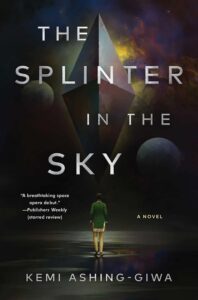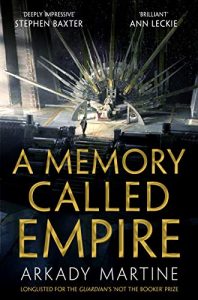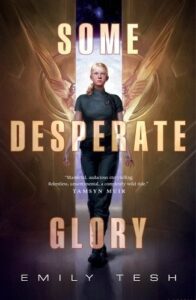Buy this from Bookshop.org to support local bookstores and the Lesbrary!
If you’re looking for a queer space opera chock full of complex politics, smoldering obsession, and ever escalating revenge, These Burning Stars by Bethany Jacobs is a worthy entry into the field. Renowned hacker Jun “Sunstep” Ironway has gotten her hands on a piece of evidence that links one of the Kingdom’s premier families, the Nightfoots, to its most infamous genocide. The Nightfoots, sitting on top an empire built of the synthetic element needed to make space gates turn on, need to silence Jun before their rivals sense blood in the water and the Kingdom descends into war. They task Esek, a scion they sent to become a cleric, to find Jun, counting on Esek’s lack of morals and fierce cruelty to get the job done. Esek and her former novitiate Chono set off after Jun and family secrets. But they are also pursued themselves. Six, a shadowy figure from Esek’s past, brings a new definition to the idea of a long game as they seek always to escalate their game of cat and mouse with Esek. As more clues and layers to the relationship between all three groups come to light, who is controlling the information becomes less and less clear. Instead, they might all be caught in the resulting conflagration. These Burning Stars is a fast-paced, gripping read with interesting world building and even more interesting characters. I had such a great time unpicking the relationships and gaping at the carnage.
First off, Jacobs doesn’t spend too much time on flogging the overall details of the Kingdom. We are zoomed in on the Nightfoots and the specific events that brought them to power, as well as the corresponding actions by the Kingdom’s enforcement Hands of clerics, secretaries, and cloaksaans. But she does drop in enough fascinating hints to give everything some flavor. The generation ships that brought them to the system are treated like museum pieces. The different population groups with slightly different customs. And, my personal favorite, the custom of gendermarks. Different groups have different customs regarding children (the children in the religious schools being trained to go into the Hands are referred to as “it” and denied a gender until gradation for instance), but the general custom is that upon reaching maturity everyone gets to choose their own gender and you announce it with the mark you wear. And, going by some hints dropped in, you can change it as simply as changing your mark.
The implications are fascinating. The Nightfoots are seen as slightly weird for being aggressively matrilineal, meaning they need a female heir who can also pop out more female heirs herself, rather limiting their pool of choice. It also means that of the main characters, Jun, Esek, Chono, and Jun’s wife Liis saw no impediment to their lives, careers, or prospects by choosing to be women. In contrast Six, who disappeared from religious school and thus never officially chose a gender, aggressively refuses to reveal theirs, sowing confusion and mild bewilderment as people struggle about how to identify and talk about them.
There is one official wlw relationship in Jun and Liis, who have lived life on the down low together for long enough to know each other in and out and develop their own couples shorthand. They both have their own skillsets and mesh them together to keep Jun’s hacker persona ahead of all attempts at capture, and when faced with tough decisions they may not always agree, but they always know how the other will want to decide. The lesbian spacer ideal. But the more page consuming relationship (although I would definitely not call it romantic) is between Esek and Chono (and Esek and Six and Chono and Six. The weird but intense energy here is off the charts). Esek literally trained Chono as her novitiate, fostered her brutal practicality, taught her to be ruthless, and in general wound herself into so much of Chono’s character that even after Chono becomes a full cleric in her own right, she can’t break free of Esek’s pull. Esek is everything to her, Esek is terrible to her, she will do terrible things for Esek, she is the one person Esek will hold back from maiming or killing on a whim. There’s a lot going on here and almost none of it is #relationshipgoals. I was hooked. And when you add in how neither of them can let the pursuit of Six go, it’s intoxicatingly dramatic.
In conclusion, if you’re looking for your next queer sci-fi read, add These Burning Stars to your list. The combination of space opera complexity and incredibly petty escalation and revenge is intoxicating. It’s the first in a trilogy, and I, for one, cannot wait for the next one to come out.





